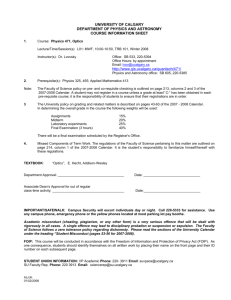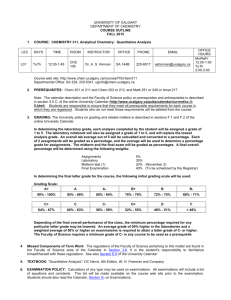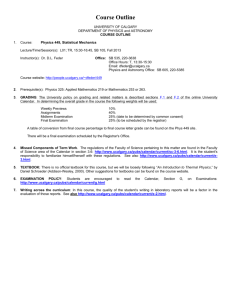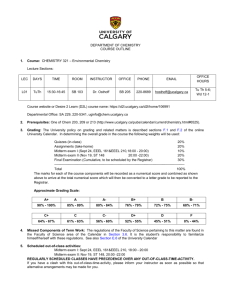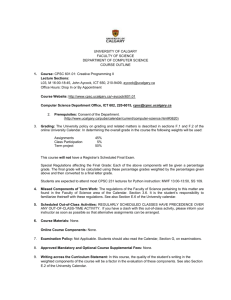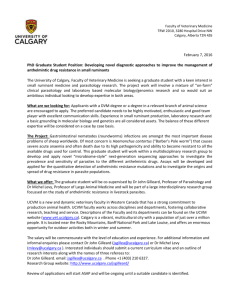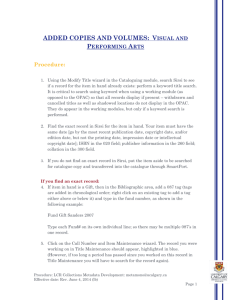507 Outline
advertisement
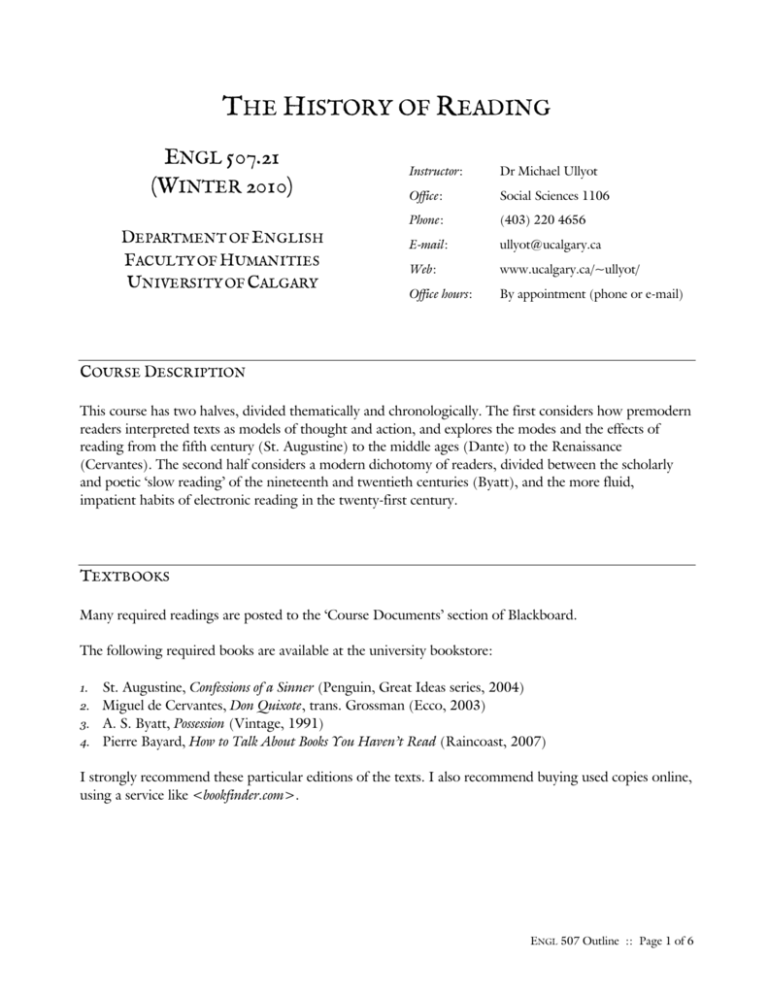
THE HISTORY OF READING
ENGL 507.21
(WINTER 2010)
DEPARTMENT OF ENGLISH
FACULTY OF HUMANITIES
UNIVERSITY OF CALGARY
Instructor:
Dr Michael Ullyot
Office:
Social Sciences 1106
Phone:
(403) 220 4656
E-mail:
ullyot@ucalgary.ca
Web:
www.ucalgary.ca/~ullyot/
Office hours:
By appointment (phone or e-mail)
COURSE DESCRIPTION
This course has two halves, divided thematically and chronologically. The first considers how premodern
readers interpreted texts as models of thought and action, and explores the modes and the effects of
reading from the fifth century (St. Augustine) to the middle ages (Dante) to the Renaissance
(Cervantes). The second half considers a modern dichotomy of readers, divided between the scholarly
and poetic ‘slow reading’ of the nineteenth and twentieth centuries (Byatt), and the more fluid,
impatient habits of electronic reading in the twenty-first century.
TEXTBOOKS
Many required readings are posted to the ‘Course Documents’ section of Blackboard.
The following required books are available at the university bookstore:
St. Augustine, Confessions of a Sinner (Penguin, Great Ideas series, 2004)
2. Miguel de Cervantes, Don Quixote, trans. Grossman (Ecco, 2003)
3. A. S. Byatt, Possession (Vintage, 1991)
4. Pierre Bayard, How to Talk About Books You Haven’t Read (Raincoast, 2007)
1.
I strongly recommend these particular editions of the texts. I also recommend buying used copies online,
using a service like <bookfinder.com>.
ENGL 507 Outline :: Page 1 of 6
R EADING S CHEDULE
Legend:
[Bb]
PDF on Blackboard
*Primary texts
12 January
INTRODUCTION
Cavallo & Chartier, “Introduction” from A History of Reading in the West [Bb]
Manguel, “The Silent Readers” from A History of Reading [Bb]
19 January
MEDIEVAL READING
* St. Augustine, Confessions of a Sinner
* Dante, Inferno V [Bb]
Manguel, “The Shape of the Book” from A History of Reading [Bb]
26 January
EARLY MODERN READING
* Cervantes, Don Quixote, Part I: Prologue, Ch 1-10 {1-75}
Fischer, “The Printed Page” from A History of Reading [Bb]
* Cervantes, Don Quixote, Part I: Ch 32 (excerpt) {266-72}; Ch 47-49 {405-27};
Ch 50-52 {428-49}
Zwicker, “Habits of Reading and Early Modern Literary Culture” from The
Cambridge History of Early Modern English Literature [Bb]
* Cervantes, Don Quixote, Part II: Prologue, Ch 1-4 {455-85}; Ch 16 {550-58}
Sherman, “Modern Theory and Early Modern Practice” from John Dee [Bb]
Sherman, “Introduction” from Used Books [Bb]
* Cervantes, Don Quixote, Part II: Ch 62 {864-75}; Ch 71-74 {919-40}
Sharpe, “Reading in Early Modern England” from Reading Revolutions [Bb]
2 February
9 February
23 February
2 March
9 March
16 March
23 March
Submit Topic
Proposal (by 26th)
MODES OF READING
* Byatt, Possession: A Romance: 1-209
Grafton, “Codex in Crisis” from Worlds Made by Words [Bb]
* Byatt, Possession: A Romance: 210-382
Kirschner, “Reading Dickens Four Ways” from The Chronicle of Higher Education
[Bb]
* Byatt, Possession: A Romance: 383-511
Grafton, “The Research Library in the Age of Google” from Daedalus [Bb]
Rosen, “People of the Screen” from The New Atlantic [Bb]
Crain, “Twilight of the Books” from The New Yorker [Bb]
Johnson, “How the E-Book Will Change the Way We Read and Write” from The
Wall Street Journal [Bb]
30 March
No Class
6 April
Submit Prospectus
N O N -R E A D I N G
Bayard, How to Talk about Books You Haven’t Read
Zaid, “In Search of the Reader” and “Diversity and Concentration” from So Many
Books
ENGL 507 Outline :: Page 2 of 6
Flood, “Philip Roth predicts novel will be minority cult within 25 years” from The
Guardian [Bb]
13 April
20 April
Work-in-Progress Talks
Submit Research Paper
EVALUATION
Participation
Topical Presentation
Critical Response
Research Paper
20%
20%
10%
50%
Each component is graded on a percentage scale. At right are their
corresponding letter-grades.
You must complete all three assignments (two presentations and
one final paper) to earn a passing grade in this course. There is no
final exam.
90 + %
85 – 89 %
80 – 84 %
77 – 79 %
74 – 76 %
70 – 73 %
67 – 69 %
64 – 66 %
60 – 63 %
55 – 59 %
50 – 54 %
0 – 49 %
A+
A
A–
B+
B
B–
C+
C
C–
D+
D
F
4.0
4.0
3.7
3.3
3.0
2.7
2.3
2.0
1.7
1.3
1.0
0
TOPICAL P RESENTATION (20%)
The Topical Presentation is a 20-minute oral presentation on a topic pertaining to one of the primary
texts we are reading that day. For full marks, you will deliver a thoughtful and well-prepared
presentation. Do not simply tell a story: develop an argument about any aspect of the prescribed topic.
Think of it as an undergraduate lecture; each presentation subject focuses on the text’s relation to other
texts or to its culture, which would be appropriate topics for an introductory lecture.
Two days before your presentation—on Sunday—submit a written summary (750-word minimum) to
the Digital Dropbox on Blackboard (Bb) for your fellow students to read in advance. All documents
should be in .RTF and/or .PDF to avoid compatibility problems.
After your presentation, lead a class discussion and address your colleagues’ questions. (I will not speak
first.) You may find it helpful to conclude your presentation with a few topics for this discussion.
The week before your presentation, I will also ask (via e-mail) two students to serve as Respondents to
your presentation. Each will offer substantive feedback on your presentation and your written summary,
and ask a question or two.
ENGL 507 Outline :: Page 3 of 6
CRITICAL R ESPONSE (10%)
The Critical Response is a shorter version of the Topical Presentation: a 10-minute oral presentation,
but on one of the secondary texts we are reading that day. For full marks, you will (again) deliver a
thoughtful and well-prepared presentation on your text. You will not merely summarize the argument, but
address methodological questions: how the author structures her argument; how she uses evidence; how
you might adapt her methods in your own criticism or historiography.
R ESEARCH P APER (50%)
Our seminar will emphasize the elements of scholarly writing for professional forums, including ways to
engage with literary criticism and cultural historiography. That means we will always read secondary
texts with attention to their methods as much as their arguments: what works, what doesn’t, and why?
What can we learn from them beyond transferrable insights?
We will also treat your scholarly writing as a work-in-progress. The final Research Paper you submit will
be the culmination of successive drafts. Research Papers will be on a topic you propose to me via e-mail
between March 22nd and 26th.
You will then submit a more formal Prospectus (about 750 words) on April 6th, and post it to Bb for
your colleagues to comment on. It will offer a few paragraphs detailing your questions and the texts
you will use to investigate them; it will also include an annotated bibliography. (These two documents
are worth 10% of the 50% paper grade.)
Then on April 13th you will deliver a 10-minute Work-in-Progress talk to the seminar: where has your
research led, and where is it going? Which critical methods are you using to answer your question(s),
and why? (This presentation is worth 5% of the 50% paper grade.)
The final draft of your Research Paper is due on Tuesday, April 20th. The length of this paper should be
at least 3000 words.
P ARTICIPATION (20%)
Participation grades depend on your consistent, collegial, and well-informed contributions to the
seminar. That means you come to class regularly, always prepared to discuss the day’s reading(s) with
your colleagues. You also respond to their presentations and their research-in-progress (including the
Prospectus for the Research Paper) regularly, thoughtfully and constructively. You respect their views,
particularly when you disagree with them—yet you also (courteously) challenge their arguments when
they appear untenable.
ENGL 507 Outline :: Page 4 of 6
The success of this seminar depends on your willingness to offer ideas, and to build on your colleagues’
ideas (including mine). Some students will inevitably speak more often than others, while others will
prefer to hold back and offer comments less frequently. However, do some self-examination to avoid the
opposing poles of anxious observer and dominating talker. If you find yourself veering in either
direction, try to do more speaking or listening.
LAPTOP P OLICY
Laptop computers will be allowed in class only if you use them for taking notes or for other courserelated purposes. Those who cause a distraction by using them for any other purpose will have this
privilege withdrawn.
Simply put, there is no need for any internet-connected program to run on your computer.
S UBMISSION P OLICIES
I do not give extensions. I penalize late papers—submitted after class ends on the due date—at a rate of
5% daily for the first two days, and 1% daily thereafter, excluding weekends and university holidays.
(For example, a paper due on Wednesday the 10th that you submit on Monday the 15th would be
penalized 11%.)
The only legitimate excuse for late submissions is a documented medical emergency—as opposed to less
drastic misfortunes like the deaths of beloved family pets. Last-minute technological malfunctions (mail
servers, printers) are your own responsibility, but you can prevent them from costing you marks by
finishing before the due date.
N.B. Please make all efforts to submit printed papers directly to me, in class. If that is impossible,
submit your assignment using the Digital Dropbox in Bb; do not take your paper to the English
Department office. Always keep a copy in case of loss.
A CADEMIC I NTEGRITY
Using any source whatsoever without clearly documenting it is a serious academic offense. If you
submit an assignment that includes material (even a very small amount) that you did not write, but that
is presented as your own work, you are guilty of plagiarism. The consequences include failure on the
assignment or in the course, and suspension or expulsion from the university. For details, see
http://www.ucalgary.ca/pubs/calendar/current/how/How_LB.htm.
ENGL 507 Outline :: Page 5 of 6
R ESOURCES
My guide to effective critical writing includes advice on drafting and revising, managing your time,
citing secondary sources, and avoiding plagiarism: http://www.ucalgary.ca/~ullyot/teaching_writing.htm
The Department’s guide to essay presentation: http://www.ucalgary.ca/UofC/eduweb/grammar/guide.htm
English Department Website: http://www.english.ucalgary.ca
Offers information about courses, programs, policies, events and contacts in the Department of English.
Academic regulations and schedules: Consult the calendar for course information, university and faculty
regulations, dates, deadlines and schedules, student, faculty and university rights and responsibilities. The
homepage for the University Calendar is: http://www.ucalgary.ca/pubs/calendar/current/index.htm
Guidelines on e-mail etiquette: http://www.ucalgary.ca/it/self_help/email/general/etiquette.html
Grade appeals: http://www.ucalgary.ca/pubs/calendar/current/how/
Consult the University Calendar under “Reappraisal of Grades and Academic Appeals.” Please note that
“mere dissatisfaction with a decision is not sufficient grounds for the appeal of a grade or other academic
decision.”
Students with disabilities: http://www.ucalgary.ca/UofC/Others/DRC/
If you are a student with a disability who may require academic accommodation, you must register with
the Disability Resource Centre (220-8237), and discuss your needs with me no later than fourteen (14)
days after the start of this course.
ENGL 507 Outline :: Page 6 of 6
